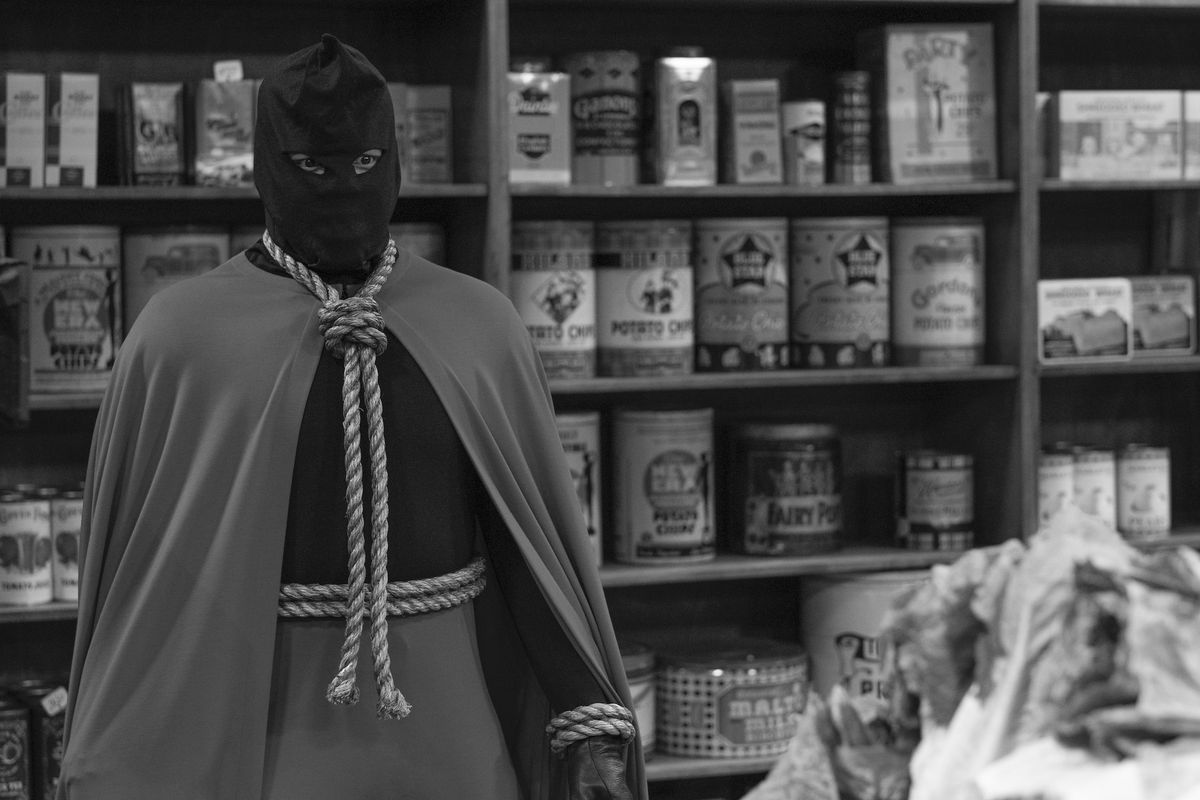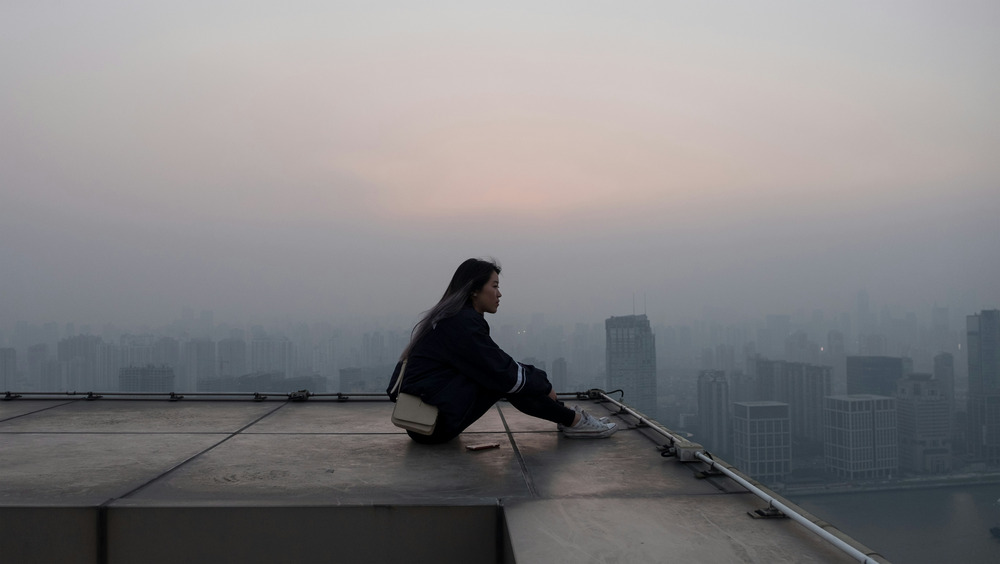Books & Culture
White Fantasy Appropriates Stories of Oppression from People of Color
"Watchmen" examines how racism has distorted who we see as our heroes

Another day, another shit show involving J. K. Rowling; I’m starting to think there’s a schedule.
I’m not a Potterhead, so I have no skin in this game, but I’ve seen enough friends and loved ones in the last couple of months lament the loss, in their words, of nothing less than their entire childhoods—childhoods handheld by the characters in the Harry Potter universe, which (like so much of our most formative reading) taught them crucial things about difference, friendship, cooperation, loneliness, harm. I’m from the X-Men generation, myself—that classic American repository of allegories on oppression and difference, its entire narrative universe founded on the premise of marginalized people fighting for their right to exist without discrimination or exploitation; to be seen as equals, and to be loved in their wholeness.
Some part of me will always love that universe. But I also know that so much of what makes up our mainstream contemporary fantasy narratives, utopian or dystopian, have been written by white authors, from Rowling’s Harry Potter to Chris Claremont’s run of X-Men (still its most well-known incarnation) to Margaret Atwood’s The Handmaid’s Tale and its contemporary TV adaptation. They reach a global, cross-cultural audience even while their narrative universes overwhelmingly center white protagonists, both on the page and on the screen.
Yet all of those stories borrow freely from the histories of oppression and intergenerational trauma that have largely befallen communities of color: racial discrimination, enslavement, apartheid, mass incarceration, state disappearance of dissidents, forced pregnancy, sterilization, and state-sanctioned rape. For marginalized kids who have seen ourselves in these stories, it comes as no coincidence—those stories have literally been built off of the lives of people like us, our parents, our grandparents, our ancestors. We were constitutionally built to relate to those stories because those stories are, in every way, about us: in writing The Handmaid’s Tale Atwood has described being inspired by, among other things, the murder of dissidents in the Philippines under the regime of dictator Ferdinand Marcos and the Argentinian junta’s policy of child abduction; X-Men’s long-standing parallels to the civil rights movement have never been subtle, with fans commonly comparing Professor X to Martin Luther King Jr. and Magneto to Malcolm X. Marvel’s Stan Lee never outright admitted that the characters were intentionally based on civil rights leaders like King—nor did he deny it. It proved beneficial, both culturally and financially, to simply allow the conclusion to be drawn by a wide swath of readers and consumers. Certainly all the friends I grew up with saw themselves and their struggles in the X-Men, even as the stories themselves centered characters who rarely looked like us.
But that dynamic is endemic to white-authored fantasy: specific stories of oppression and marginalization that have been hollowed out of their historical context and replaced with white leading characters, in a kind of reverse Get Out. Apocalyptic narratives about people having to flee their homes because of climate disaster, or compete with each other over dwindling resources underneath a fascist state, or submit to a patriarchal regime that rules over their entire biopolitical reality—from The Day After Tomorrow to The Hunger Games to The Handmaid’s Tale—overwhelmingly center characters whose racial specifics have been conveniently left unspoken, neutral. This means, of course, that when they are adapted to screen, these characters are nearly always played by white stars, Hollywood’s way of saying the quiet part out loud: that neutral always means white.
This, despite the fact that, in our own apocalyptic present, it is patently not white people who will bear the brunt of our impending climate doom, and not white people toiling at the bottom levels of our capitalist fight club. This combination of deliberate narrative withholding and the racialized assumptions it permits—which are then confirmed by Hollywood casting—tells us that stories about oppression and marginalization only become universally worthy, relevant, and relatable when the faces on the book covers and movie posters are white; when the bodies being systematically (and sympathetically) oppressed are white.
Apocalyptic narratives overwhelmingly center characters whose racial specifics have been conveniently left unspoken, neutral.
When Rowling’s transphobia became more regularly discussed among the wider reading public (BIPOC readers have been pointing out the latent racism in the Potterverse since the books’ publication), I often saw readers and fans lament their disappointment in Rowling’s views, struggling to make those views line up with the allegories of difference and triumph that they had nevertheless found in those narrative worlds. I saw readers expend great intellectual and emotional effort to salvage what they had once treasured in her works, the characters and passages they’d been saved by—an effort I sympathize with, understand, and have gone through myself. I’ve personally never been particularly interested in separating the art from the artist, an impulse of exceedingly mild intellectual rigor, which has only ever really served the powerful and protected abusers. What I would point out, however, is that this very dynamic—taking stories of oppression and marginalization, stripping them of most of their racial and historical specificity (leaving just enough to add a frisson of exotic/erotic flavor), and recasting them with white bodies—is at the heart of most white fantasy, and thus is also the source of the incongruence that minority readers later struggle with, when those authors turn out to care little at all about the oppression they once so beautifully illustrated.
How can a writer who wrote so convincingly about being a misfit be so indifferent to the plight of misfits in front of her? How could Marvel, home of X-Men, that supposed bastion of civil rights metaphors, be at the crux of such right-wing, misogynist, racist, homophobic fervor as Comicsgate, the reactionary harassment campaigns waged by fandoms against perceived social justice warriors—feminists, antiracists, queer artists and readers—out to ruin their precious comics? How could those fans miss the irony of attacking minorities while at the same time defending classic allegories of oppression, devoted to narratives of resistance and community-building?
The truth is, these worlds may have only ever nominally been interested in oppression and difference—that shallow, cosplay-like understanding of oppression makes itself clear when authors like Rowling are taken to task for their actual opinions on marginalized people. I can no longer muster up disappointment when white authors whose works supposedly deal in equality and justice show themselves (and the reactionary readers who love them) to not be remotely interested in either equality or justice—not when both the origin story and the material effect of that work have been to lift from the historical struggle of racial, sexual, and economic minorities, and replace those bodies with white, cis, straight characters. Were these works ever truly concerned by justice to begin with? Or were they simply enamored with and appropriative of its language—its culture, its aesthetic, its narrative style? Oppression chic, equalitycore.
In contrast to the limited imaginary worlds like X-Men and the Potter universe, I can think of one contemporary example of narrative fantasy storytelling that goes beyond the gestures of oppression cosplay, and deals explicitly with the unbearably intimate relationship between heroism and historical trauma: HBO’s Watchmen, specifically its first and sixth episodes.
White American showrunner Damon Lindelof called his series a “remix” of DC’s Watchmen comics, created by white English author Alan Moore and artist Dave Gibbons. The show takes place over thirty years after the original comic series, in an alternate 20th-century universe in which vigilantes—former superheroes—have been made outlaws. A fake alien attack on New York City in 1985, orchestrated by former vigilante Ozymandias, has wiped three million people from the planet, bringing previously battling nations together against their alien common enemy; postwar Vietnam has become the 51st state, and the birthplace of our protagonist, played by Regina King.
Taking stories of oppression and marginalization, stripping them of most of their racial and historical specificity, and recasting them with white bodies—is at the heart of most white fantasy.
That’s a lot to take in. But what I’m most interested in is how the show uses the structure of fantasy, specifically the superhero myth, to excavate the unnamed and often faceless histories hidden beneath those masks, under those capes. HBO’s Watchmen relocates the action of the story to Tulsa, Oklahoma, in 2019 (mostly). A white supremacist group called the Seventh Kavalry has been waging a war against minorities and the police after a state policy has been put in place to administer reparations for racial injustice, stemming back to a specific—and historically accurate—event that Watchmen’s first episode orchestrates with titanic clarity and commitment: the Tulsa Race Massacre of 1921, in which mobs of white residents launched a mass attack on Black residents and Black-owned businesses in the Greenwood District of Tulsa, at the time the wealthiest Black community in America and sometimes called “Black Wall Street.”
HBO’s Watchmen imagines that most alternate of alternate universes: one where racial justice might be served—not permanently, not perfectly, but practically, and with intent. In this universe, descendants of those affected by the Tulsa massacre are entitled to reparations; a widely available DNA test determines the connection, and ancestry research is reimagined not just as a dubiously trackable data-collection opportunity for late capitalist self-actualizers, in the vein of 23andMe, but as an intimate, bodily inheritance that makes future justice possible. Here, a historical catastrophe like the Tulsa massacre is not just something we can know or unknow, something we can either be aware of or be simply, innocently ignorant of—history is a deposit in our bones, there in the blood and saliva.
Regina King plays Angela Abar, an orphaned police detective born to Black American soldiers in occupied Vietnam, now living in Tulsa, where her extended family is from. While ostensibly now making a living as a baker, Abar also moonlights as the vigilante Sister Night, tracking down Seventh Kavalry suspects when her daylight capacity as a cop falls short. When I first started watching the show and realized that the main characters were going to be police officers, my heart sank; so many American shows are obsessed with humanizing—and justifying—the presence of law enforcement and military command, from dramas like Watchmen to comedies like Brooklyn 99 and tentpole movies like The Avengers. Try to get away from the police state in American narrative life: you won’t get far. I didn’t want to watch another show about a good cop, not in a country where you can’t turn left or right without hearing about yet another instance of anti-Black police brutality. And until I watched Watchmen’s sixth episode, I was sure that it would be the kind of show I dreaded. I was, mostly, wrong.
Watchmen, it turns out, is entirely interested in humanizing a police officer, but not to sweep under the rug the systemic racial discrimination of our inherently broken police state: it uses the loftier metaphors of heroism and vigilantism to ask questions about how we come to shape the figure that justice takes in our imagination—who we come to imagine as our heroes, and how we come to shape ourselves in their mold. The sixth episode of Watchmen imagines that Angela has taken an extreme dose of a drug belonging to her grandfather, Will Reeves, whom she’s only just met—right after he’s seemingly murdered her close friend, the white police chief of Tulsa, Judd Crawford. The drug is called Nostalgia, a pill manufactured to contain a person’s memories, and which in the Watchmen universe has been outlawed due to its tendency to make its users psychotic. Angela takes her grandfather’s Nostalgia in order to understand why he may have murdered her friend and colleague; what follows is a journey through American history unlike any I’ve seen on television.
Earlier in the episode, we’d opened on the conspicuously white face of the hero we’ve come to identify as Hooded Justice, a character that exists in the original Watchmen comics; the only vigilante in the original series whose true identity is never discovered. Hooded Justice is, as his moniker implies, hooded, with a cut-off noose around his neck. In the opening scene of the episode, we see Hooded Justice vigorously and bloodily applying his namesake to some homophobic policemen in an interrogation scene. Later, we realize it’s all make-believe, a TV episode aimed at a rapt American viewing public. Here the show establishes a truth, which it will gradually begin to dismantle: this white man, the one with the blue-green eyes, is what Hooded Justice looks like—at least to most Americans.
When Angela travels deep down into her grandfather’s memories, she discovers another face entirely. The show imagines that Angela quasi-becomes her grandfather, with some scenes glitching in between their faces and bodies, so the border between them dissolves; she is literally living his memories, in his clothes, in both her body and his.
That inbetweenness brings Angela into an unbearably heightened intimacy with her grandfather, one in which she realizes how inescapably she is implicated in (and eventually, as she later learns, responsible for) events that make her life possible. In Watchmen, the violence of the vigilante isn’t left mysterious, singular, and merely “existential,” it; instead it is carefully, deliberately given all the dignity and despair of its history, fully lived. When Angela experiences firsthand the devastation of her grandfather’s life, King telegraphs that grief and rage in a way that feels at once worldweary and newborn, like someone weeping from two different people’s eyes. And isn’t that, in the end, what intergenerational trauma feels like?
I didn’t want to watch another show about a good cop, not in a country where you can’t turn left or right without hearing about yet another instance of anti-Black police brutality.
Slipping into these memories along with Angela, we meet a young boy, watching a silent movie in a Black-owned theater in Tulsa’s Greenwood District, while his mother plays the accompaniment musical track on the piano. The movie is the child’s favorite, containing one of the most formative scenes of his life: a scene in which white townspeople are saved from their corrupt white sheriff by a masked hero, a Wild West lawman who then removes his mask, to the excitement of the benevolent townspeople; the hero is a man named Bass Reeves, “the Black Marshal of Oklahoma,” who tells them their own sheriff is the villain that has been stealing their cattle. Then he intones his fateful lesson: “Trust in the law!”
Preoccupied by the early lessons taught by his favorite hero, Bass Reeves, Will becomes a New York City police officer in an almost entirely white police force. The only other Black police officer, an older man named Sam Battle, is also the only one who agrees to pin Will’s officer badge on him during his welcome ceremony. (Battle is yet another historically accurate character, a reference to Samuel Jesse Battle, the first Black NYPD officer.) Will says that he joined the police force because he looked up to Lieutenant Battle; Battle smiles a little wearily, then whispers to him, urgently: “Beware of the Cyclops.”
We’ll learn who and what the Cyclops is—or rather, Angela/Will will learn, up close, and in the flesh. It comes as no surprise that Will’s fellow police officers are actively and institutionally racist, undermining him at every turn and protecting white supremacists, like the one Will sees burning down a Jewish deli. Will’s attempt to get justice—to do the job he signed up for—culminates in one of the most singularly horrifying sequences on American television, in which Will’s police colleagues (the drivers of the car I described earlier) stalk, viciously beat, then proceed to lynch him. The show puts viewers behind Will’s eyes as he wakes up behind the hood his attackers have put over him, the noose around his neck dragging him up, up, and up—until, at the very last minute, they spare him, laughing, with a warning.
It is the only example in American television I can think of that brings viewers into such profound, inescapable intimacy with one of America’s foundational anti-Black terrors, the uniquely American practice of lynching. It shares space with the indispensable compilation The Black Book, edited by Toni Morrison, as one of the few cultural instances in which the American history of lynching is presented from a Black perspective (and not just through the eyes of white writers and their protagonists, as in Harper Lee’s school staple, To Kill a Mockingbird). Will, in his dazed, broken survival, wanders the streets and randomly comes across a couple being beaten by thugs. Still wearing the noose, he puts on the hood his attackers had forced on him—reclaiming this dehumanizing anonymity for his own protection—and jumps upon the thugs, beating them back and ultimately saving the couple, who quickly thank their anonymous savior before fleeing.
Watchmen uses the loftier metaphors of heroism and vigilantism to ask questions about how we come to shape the figure that justice takes in our imagination.
We are witnessing the birth of Hooded Justice: not a white man with blue-green eyes at all, but a young Black man, an inheritor of the Tulsa massacre, who wears the noose and hood thrust on him by his would-be lynchers. It is a phenomenally radical imagining of an existing comic book character, one that takes the heroic vigilante trope so globally beloved and uses it to ask questions about the intimate, gut- deep agonies of trauma, oppression, and justice. Will, like any number of scared, traumatized kids, watches a man who looks like him become a hero through a fantasy of law enforcement—“trust in the law”—so he, too, becomes a police officer. But his life shows him that the violence that led him to believe in that heroic fantasy is the same violence that will wake him from it. Here there are no grateful white townspeople; when you reveal the corrupt white sheriff, you get beaten and lynched. Will turns from his Bass Reeves fantasy to a grimmer identity; takes the horror that has been dealt to him, and turns it into a weapon.
And this is where the episode finally fulfills the promise that its pilot made by centering the show in Tulsa to begin with. The episode isn’t interested just in how Will becomes disillusioned with the police state and thus steps into his true, fulfilling self as the vigilante Hooded Justice—another narrative path I was dreading. No, the show is invested in something much deeper, much harder to parse: the persistence of intergenerational trauma and its effect on a person’s physical and emotional growth; the unforgiving war of attrition that the pursuit of justice can often feel like, especially for those restlessly seeking it alone, against an indifferent world. The show is interested in how the longing for justice, unfulfilled, can literally break us down: break our families apart, break our bodies apart. It asks impossible questions, like why do people—people of color in particular—sometimes paradoxically long for the heroic validation and redemptive power promised by law enforcement, when their own histories so clearly show that law enforcement has rarely been their friend? It’s something I wonder about my own Filipinx community, one that bears the traces of having once been the fought over Pacific property in America’s colonial real estate grab, a conflict that culminated in a policy of genocide that claimed, some say (the official American documents of the period are, of course, to be mistrusted), over a million native lives. And yet my extended family is punctuated with proud US Army and Navy soldiers stationed everywhere in the world; trusting in the law.
The show is interested in how the longing for justice, unfulfilled, can literally break us down: break our families apart, break our bodies apart.
We discover later that Hooded Justice is a closeted gay man; he has to meet his white lover, fellow vigilante Captain Metropolis, in secret. It’s not just a double life, but a triple life, a quadruple life. Captain Metropolis urges Hooded Justice to keep his identity hidden from their fellow vigilantes, who aren’t as “tolerant” (that buzzword of the white liberal racist) as he is; Hooded Justice regularly wears white makeup around the parts of his eyes visible through the hood’s gaps. Tangled knot after tangled knot weave in Hooded Justice’s psyche, there where the self meets mask, where the hunger for power and justice settles for the exhausting cycle of violence and vengeance, where the desire for true connection and sexual fulfillment settles for condescending companionship and racialized fetishizing. When Will finally stumbles upon the grand plan of the Cyclops (the obvious KKK stand-in, who are plotting to gain societal power through mind control, and whose presence in Watchmen is drawn from our own very present realities: a 2006 FBI intelligence assessment detailed organized white supremacist infiltration in state police forces, such as neo-Nazi gang the Lynwood Vikings, which thrived in the Los Angeles County Sheriff’s Department), Will asks for help from his lover and supposedly fellow masked heroes. But he soon realizes they’re not in this fight together; they’re not even in the same fight. Again, he is alone, against a group of white people not there to help him, in a hood, with a noose around his neck.
Mainstream heroic wisdom, especially in the settler colonial American psyche, still so enthralled with its hardy independence and its pioneering spirit, asks us to worship the figure of the vigilante hero as a singular aberration and miracle—a superhero, unique unto himself. The mainstream vigilante’s spectacular acts of violence or heroism are coded as nonpolitical eruptions in the nonpolitical everyday: vigilante heroes vote libertarian (if indeed they vote at all). This vision of the vigilante is, above all, special. But in Watchmen, the vigilante’s origin story has at its foundation our inescapably political and inextricably shared everyday: the pain, violence, and grief in Will’s story isn’t an aberration at all, but the pangs of a much greater— and much more joint—malady.
The show points to the lone vigilante in American culture and reveals that he has always been a lie: the work of justice was never meant to be solitary. We inherit that work from each other; we inherit it from people we don’t even know. Our history is in each other, like deposits in the bones, there in the blood and saliva. In this we are not special. Most poignant of all is the realization that Hooded Justice is—horrifically, historically—ordinary. He’s not just a vigilante, not just a superhero. He’s an American.
From How to Read Now by Elaine Castillo, published by Viking, an imprint of Penguin Publishing Group, a division of Penguin Random House, LLC. Copyright © 2022 by Elaine Castillo.









